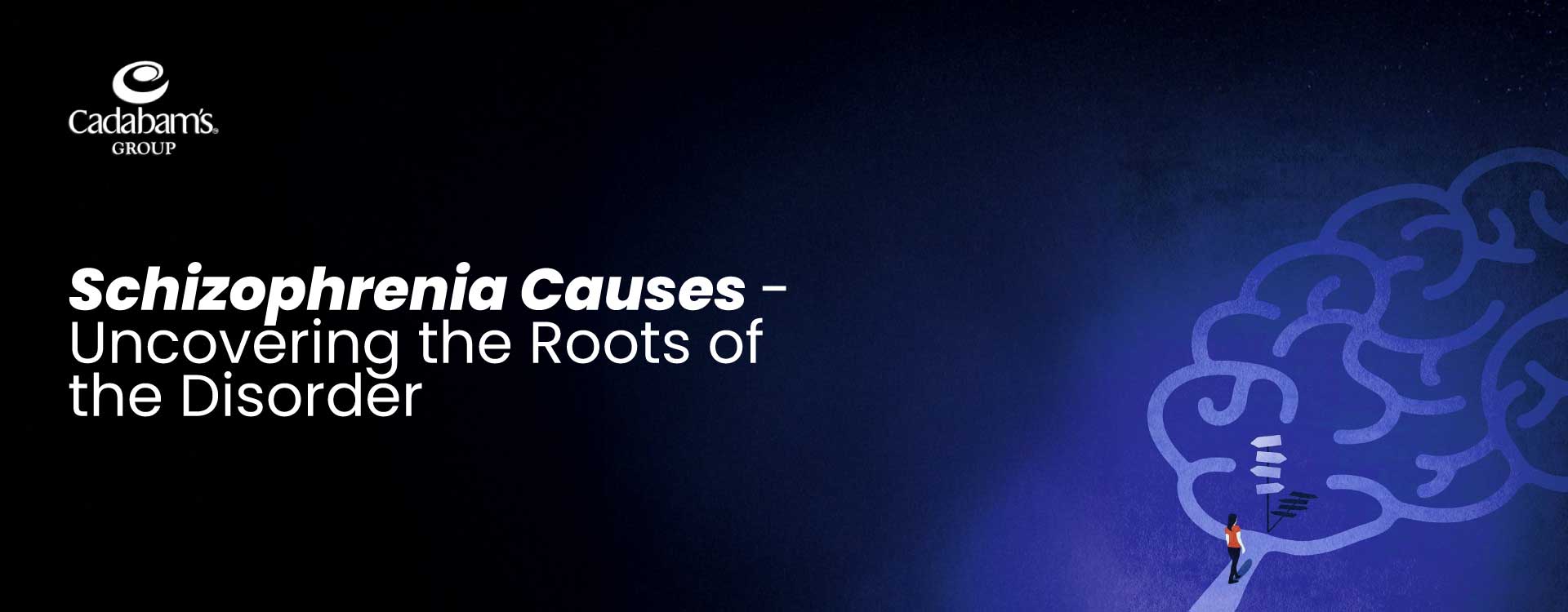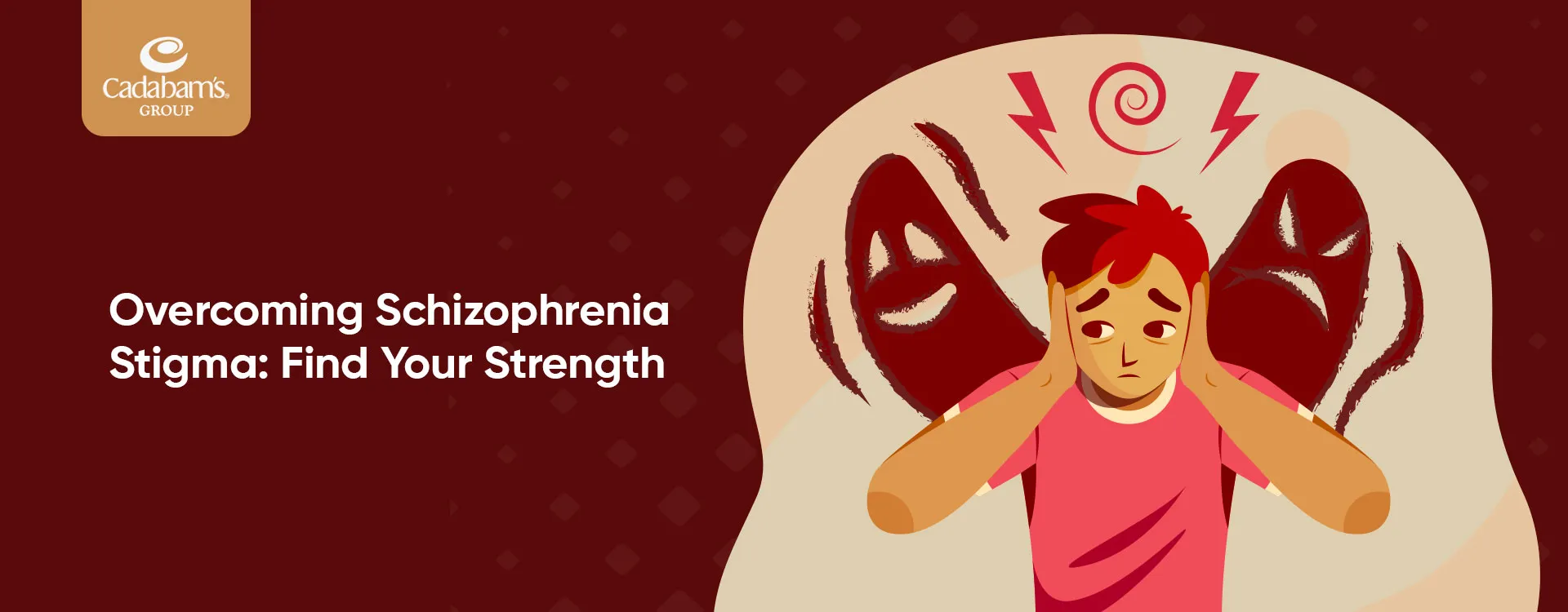Research studies estimate that Schizophrenia affects 1 percent of the population, especially adults worldwide. It is a mental disorder that appears in late adolescence or even early adulthood. It commonly strikes between the ages of 16 and 30, and most of the males, compared to females, tend to show off the symptoms at a slightly younger age.
Schizophrenia is a mental disorder that really changes how a person behaves and their thinking patterns. The condition can take time to develop during the teenage years, but the symptoms start showing during the early 20s. Schizophrenia symptoms include being socially withdrawn, unresponsive, or changes in sleeping patterns, amongst other behavioral changes.
Symptoms of Schizophrenia
The symptoms are classified into – Positive and Negative Symptoms.
Positive symptoms include any change in behavior or experiencing hallucinations or delusions.
Hallucinations
This happens when a person sees, hears, smells, tastes, or feels stuff that does not exist in reality. The most common hallucination is hearing voices or auditory hallucinations. This experience is very real to the person experiencing it, even if normal people around them can’t experience the sensations. The voices may sound like they are describing activities, discussing thoughts, giving instructions, and so on.
Delusions
A delusion is a strong belief in something that may not be real, and schizophrenia's mental disorder can include delusions. For instance, they may feel like someone is following them or monitoring their actions.
The Negative symptoms include people withdrawing from social situations, taking no interest in the world around them, and appearing apathetic or emotionless.
What Are the Causes of Schizophrenia?
The causes of schizophrenia are not fully understood. They are likely to be a combination of heredity and other factors. It is probable that some people are born with a predisposition to developing this kind of illness and that certain things- for example, stress or the use of drugs such as marijuana or LSD can trigger their first episode.
The factors contributing to the onset of schizophrenia are-
Genetical Inheritance Triggers
Do you know the chance of you developing schizophrenia is higher than 50 percent if you have a twin with the disorder? However, there is less than a 1 percent chance of developing it If there is no history of this disorder in the family. However, the risk rises to about 10 percent if a parent is diagnosed with schizophrenia. In many cases, schizophrenia can run in families. If an individual’s family members have schizophrenia, the individual would be more vulnerable to it when compared to others who do not have a family history of schizophrenia.
Environmental Triggers
Studies show that stress-inducing factors such as exposure to viral infections, low oxygen levels during birth, early parental loss, and bad-tempered and stressful experiences can be causes of schizophrenia.
Chemical Imbalances in the Brain
Experts believe that abnormalities in the brain structure or abnormal brain chemistry can also be a prominent cause of schizophrenia. Studies also show that the brain structure of schizophrenics is quite different than it was at the time of birth. Particular differences in brain structures play an important role in schizophrenia. These changes are present in all individuals with schizophrenia, but they do suggest that it is a disorder of the brain. Some of the differences are larger brain ventricles and fewer brain connections.
Neurotransmitters
Neurotransmitters are brain chemicals that play an important role in controlling body and brain functions. It is believed that certain imbalances in these brain chemicals can also result in schizophrenia symptoms. This assumption persists because medications that increase or decrease these chemicals are seen to be effective in reducing the majority of these symptoms.
Pregnancy and Birth Complications Linked to Schizophrenia
Studies have found a connection between schizophrenia and certain issues that can happen before and during birth. If someone has schizophrenia, there's a higher chance they might have faced complications like:
- Being born with low birth weight.
- Being born prematurely.
- Not getting enough oxygen during birth (known as asphyxia).
These kinds of birth difficulties could have a small but significant impact on how the brain develops.
Drugs and Substance Abusers
Psychotropic drugs such as LSD and marijuana can possibly lead to schizophrenia. The more prolonged the drug abuse, the more likely there is a chance of you getting the symptoms of schizophrenia, such as delusions, hallucinations, inappropriate emotions, and trouble thinking.
Studies indicate that teens and young adults who frequently use cannabis have a higher risk of developing schizophrenia later in life, especially with stronger strains of cannabis.
Triggers for Schizophrenia in At-Risk Individuals
Certain life events can act as triggers for schizophrenia in people who might be prone to it. These aren't direct causes but can set things in motion for those already at risk.
Here's what might set it off:
Stress
It's a big factor. Think about those really tough times in life, like:
- Going through the loss of a loved one.
- Losing your job or your home.
- Getting a divorce or ending a serious relationship.
- Experiencing any form of abuse, whether it's physical, sexual, or emotional.
Remember, these situations are tough for anyone, but they don't directly cause schizophrenia. They can, however, be the last straw for someone who's already vulnerable.
Social Factors
Social factors may not cause schizophrenia, but they are seen to be significant in relapse. When an individual with schizophrenia is able to manage his/her symptoms but is criticized and discriminated against beyond their tolerance, they may fall back to their previous state.
Diagnosis of Schizophrenia
Schizophrenia causes, and the triggers of the condition are diagnosed after a thorough assessment.
Schizophrenia is usually diagnosed if-
- You have experienced delusions, hallucinations, hearing voices, incoherent speech, or apathy.
- Your symptoms have a significant impact on your ability to perform your daily routines like work and study.
- Once all other causes, like recreational drug use and bipolar disorder, are ruled out.
Diagnosing Kids and Young Adults
Schizophrenia disease is quite intense if found in children and young adults, which is why it’s essential to refer to a mental health doctor as soon as possible. There should be an early intervention service for kids who are 14 years or younger; the team should include psychiatrists and professionals specialized in dealing with children and adolescents.
Related Illnesses
Sometimes, it’s not very clear when someone has schizophrenia, especially when they are exhibiting signs that are similar to other mental disorders. Diseases that are similar to bipolar disorders and schizoaffective disorders.
When to See a Doctor in Schizophrenia
- Seek medical advice if experiencing hallucinations, delusions, or disordered thinking.
- Consult a doctor for significant changes in behavior, social withdrawal, or emotional numbness.
- Immediate attention is needed if there are any signs of self-harm or harm to others.
- Early intervention is crucial for effective treatment and management.
- Family members should encourage those showing symptoms to seek professional help.
Schizophrenia Treatment
There is no specific way to prevent Schizophrenia mental disorder. However, early treatment and diagnosis may help to get the symptoms under control before the development of serious complications.
With proper treatment, schizophrenics can lead a productive life. The treatments for schizophrenia can help in relieving many symptoms. The most effective types of treatments for schizophrenia people involve a combination of the following-
- Medications such as anti-psychosis drugs
- Therapies such as Cognitive behavioral therapy, group therapy, etc
- Self-help resources
- Psychological counseling methods
Adhering to the treatment plan can help in reducing the worsening of the schizophrenia condition and also help in preventing risk factors like relapses.
Rehabilitation
If a diagnosis is suspected, then your doctor will refer you to a psychiatrist or to a rehabilitation facility for schizophrenia. Here, there are various mental health professionals who can prescribe the right treatment plan and medication. In severe episodes, a longer stay at a rehabilitation center may be advised until symptoms are under control.
Embracing Support and Treatment at Cadabam's for Schizophrenia
Since the patients have delusions and hallucinations, they hesitate to go to a general Physician because they believe that nothing is wrong with them. If someone has acute schizophrenic episodes for the first time, then it’s necessary that a friend or a loved one persuade them to visit a GP. Family intervention is essential in ensuring that the individual gets the timely treatment they need.
Schizophrenia, if left untreated, can result in serious problems that can affect every area of your loved one’s life. If you have a loved one with schizophrenia, then you need not worry, as Cadabams can provide the right kind of treatment and support.
If you are searching for the best possible treatment option, Cadabams Rehabilitation Centre for Schizophrenia can help you with our team of specialized experts. We have been helping thousands of people live healthier and happier lives for 30+ years. We leverage evidence-based approaches and holistic treatment methods to help individuals effectively manage schizophrenia. Get in touch with us today. You can call us at +91 96111 94949.
FAQs
1. What are the main causes of schizophrenia?
The causes of schizophrenia are multifold. The main causes of the disorder range from genetic predisposition to environmental factors and psychological factors. Incidents that cause trauma can also play a role, while research has shown that substance abuse also has a role to play in influencing the incidence of the disorder.
2. Does schizophrenia come and go?
Schizophrenia is a chronic mental health disorder. While the symptoms may vary in severity depending on episodes, the disorder itself is mostly life-long in nature. There will be situations where a person will face increased severity of their symptoms.
.webp)




.jpg)


